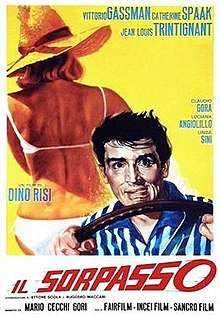Il Sorpasso
Il sorpasso (lit. '"the overtaking"', occasionally titled The Easy Life) is a 1962 Italian cult comedy film co-written and directed by Dino Risi and starring Vittorio Gassman, Jean-Louis Trintignant and Catherine Spaak. It is considered Risi's masterpiece and one of the best examples of Commedia all'italiana film genre.
| Il sorpasso | |
|---|---|
 Italian film poster | |
| Directed by | Dino Risi |
| Produced by | Mario Cecchi Gori |
| Written by | Rodolfo Sonego |
| Screenplay by | Dino Risi Ettore Scola Ruggero Maccari |
| Starring | Vittorio Gassman Jean-Louis Trintignant Catherine Spaak |
| Music by | Riz Ortolani |
| Cinematography | Alfio Contini |
| Edited by | Maurizio Lucidi |
Release date | 6 December 1962 (Italy) 22 December 1963 (U.S.) |
Running time | 105 minutes |
| Country | Italy |
| Language | Italian |
Plot
The film starts in a hazy, sun-baked and seemingly empty Rome on an August morning during Ferragosto national holiday. A young, timid law student, Roberto (Trintignant), gazing out his window, is asked for trivial favor, a phone call, by a 40-ish man named Bruno (Gassman), who is passing on the street below at the wheel of a convertible Lancia Aurelia.
The young man tells him to come up and make the call himself. After Bruno fails to contact his friends — he is running a full hour late for his meeting with them, something he apparently doesn't deem a good motive enough for them to have "abandoned" him— he insists on repaying Roberto's courtesy with an aperitivo. Tired of studying for the day and falling prey to Bruno's enthusiasm, the young man accepts.
Thus begins a cruise along the Via Aurelia, the Roman road that also gives the name to Bruno's beloved car. Roberto is unwilling or unable to part from this casual acquaintance despite having almost nothing in common with him. Bruno is loud, brash, risk taking, a bit coarse and a braggart, to boot. He drives recklessly, speeding and constantly attempting "il Sorpasso" — the impatient and aggressive practice of serial tailgating and honking to overtake other cars on the road. But he is also charming and likable. And Roberto, being his complete opposite, feels drawn to Bruno's impulsive, devil-may-care attitude.
Over two days of highs and lows across the coasts of Lazio and Tuscany, the two men fall into various adventures while gradually managing to learn something of each other. When, for example, the duo spontaneously drops in on Roberto's relatives, en route, the young law student suddenly realizes that his childhood wasn't as golden as he'd always imagined. And later he finds out about Bruno's failed marriage and young daughter, revealing a life not nearly as carefree as Bruno pretends to lead.
When this free-wheeling road-trip movie crescendos to its dramatic ending, the bonding and emerging friendship between the two men is cut short. Spurred on by a seemingly transformed Roberto, Bruno speeds while attempting to overtake another car on the blind curve of a cliffside road. This risky maneuver results in a fatal accident. The younger man goes over a rocky cliff in the car, leaving a bloodied and shocked Bruno on the curve's edge. When a motorway cop arrives and asks Bruno for Roberto's last name, the survivor realizes he does not even know it.
Cast
- Vittorio Gassman - Bruno Cortona
- Jean-Louis Trintignant - Roberto Mariani
- Catherine Spaak - Lilli Cortona
- Claudio Gora - Bibi
- Luigi Zerbinati - commendatore
- Luciana Angiolillo - Bruno's wife
- Linda Sini - Aunt Lidia
- Nando Angelini - Amedeo
Reception and legacy
The movie is considered as one of the best examples of Commedia all'Italiana.
Film critics frequently acknowledge that the story offers a poignant portrait of Italy in the early 1960s, when the "economic miracle" (dubbed the "boom" — using the actual English word — by the local media) was starting to transform the country from a traditionally agricultural and family-centered society into a shallower, individualistic and consumeristic one.
The Roman customizer crew Emporio Elaborazioni Meccaniche dedicated a customized bike to the movie. They named a MotoGuzzi V11 cafe racer: "Sorpasso".[1]
Soundtrack
The soundtrack includes original themes by Riz Ortolani, and Italian 1960s hits such as "Saint Tropez Twist" by Peppino di Capri, "Quando, quando, quando" performed by Emilio Pericoli, "Guarda come dondolo" and "Pinne fucile ed occhiali" by Edoardo Vianello and "Vecchio frac" by Domenico Modugno.
Awards
- Italian National Syndicate of Film Journalists Nastro d'Argento
- Winner: Best Actor (Migliore Attore Protagonista)- Vittorio Gassman
- Mar de Plata Film Festival
- Winner: Best Director- Dino Risi
References
External links
- Il Sorpasso on IMDb
- Il sorpasso: Italy, Dark and Light an essay by Antonio Monda at the Criterion Collection